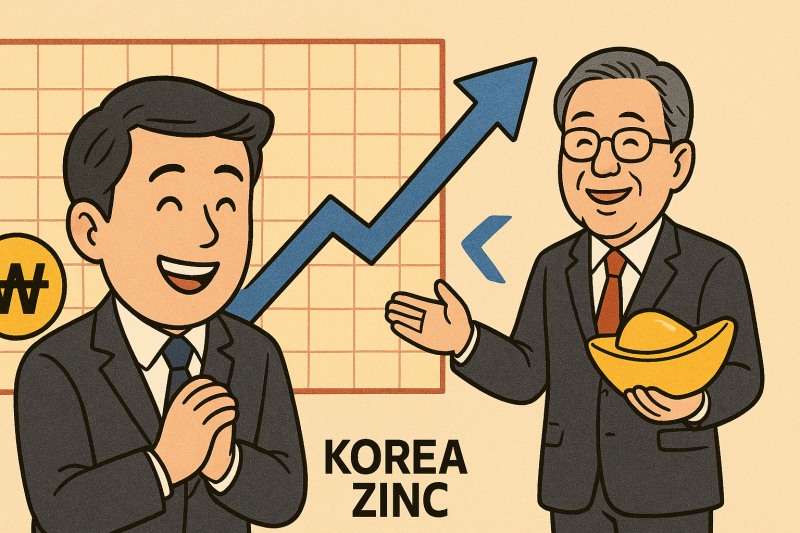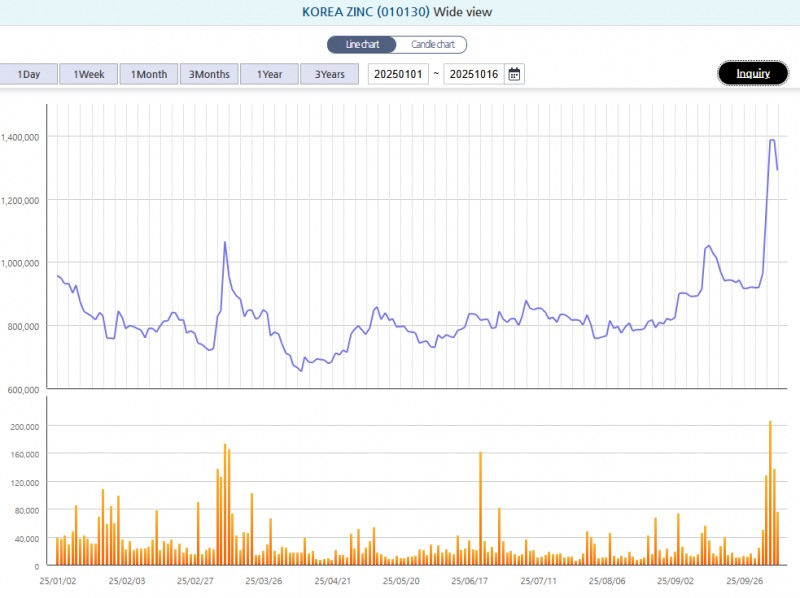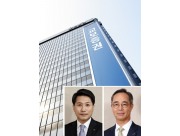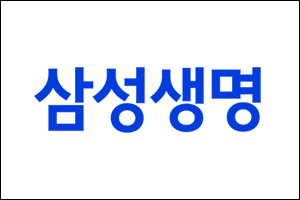Korea Zinc's share price stood at KRW 1.386 million as of the 15th, surging 44 percent in just three trading sessions from KRW 965,000 on the 10th.
Behind Korea Zinc's share price jump lies US-China trade tensions. On the 9th, China's Ministry of Commerce announced it would strengthen rare earth export controls beyond previous levels. Rare earths are strategic resources used in advanced technology and military industries. Expectations exist that Korea Zinc will reap benefits as the US responds through global supply chain restructuring.
Additionally, rising prices of precious metals such as gold and silver, and rare metals handled by Korea Zinc amid intensifying US-China disputes are cited as positive factors for company performance.
Korea Zinc operates a business structure recovering precious metals and rare metals as by-products from its core zinc and lead smelting processes.
Among non-ferrous metal sales in the first half of this year, zinc and lead accounted for 39.8 percent, down nearly 10 percentage points from 49.3 percent at the end of last year. While zinc and lead struggled with price weakness, proportions of gold (10.4 percent) and silver (26.4 percent) expanded.
For rare metals, sales increased 3.5-fold from KRW 42 billion in the second quarter of last year to KRW 146 billion in the second quarter of this year. Major minerals include antimony (70 percent of sales) and indium (10 percent), used in military industries.
Interpretations suggest that Chairman Choi and management's strategic expansion of rare metals business proved prescient. Korea Zinc stated: "We continuously improve rare metal recovery rates, maintaining industry-leading profitability." Chairman Choi demonstrated commitment by accompanying the Korea-US summit in August as part of the economic delegation, directly discussing supply chain cooperation with US government officials. Indeed, Korea Zinc signed a memorandum of understanding (MOU) with US-based Lockheed Martin for germanium supply.
However, investors should note that Korea Zinc's share price has already risen substantially. The fact that the US-bound rare metals business remains in early stages must also be considered. Germanium exports under the MOU with Lockheed Martin are scheduled to begin around 2028. While antimony exports to the US started last June, volumes remain extremely low.
On the 16th, the share price closed at KRW 1.289 million, down 7 percent from the previous day due to profit-taking sell-offs.
Gwak Horyung (horr@fntimes.com)































![[DCM] HD현대오일뱅크, 정제마진 개선 의미와 신용도 재평가](https://cfnimage.commutil.kr/phpwas/restmb_setimgmake.php?pp=006&w=69&h=45&m=5&simg=2026020306545306387a837df6494123820583.jpg&nmt=18)

!['따로 또 같이' 디지털자산 동맹···임종룡 우리금융 회장의 선택은 [디지털자산 지형도]](https://cfnimage.commutil.kr/phpwas/restmb_setimgmake.php?pp=006&w=69&h=45&m=5&simg=2026020307355101854b4a7c6999c121131189150.jpg&nmt=18)
![[금융가Talk] SBI저축은행, '올해의 SBI인' 대상에 최초 개인직원이 받은 배경은](https://cfnimage.commutil.kr/phpwas/restmb_setimgmake.php?pp=006&w=69&h=45&m=5&simg=2024060418244608758237391cf8611513838246.jpg&nmt=18)

![국민 ELD·신한 목표전환형 펀드···증권사 IMA 대적할 수 있을까 [은행권 머니무브 방어전]](https://cfnimage.commutil.kr/phpwas/restmb_setimgmake.php?pp=006&w=69&h=45&m=5&simg=20260202165703014065e6e69892f18396169112.jpg&nmt=18)
![박남영 미래에셋증권 IMA본부장 "규모 경쟁보다 내실 중점" ['1호 IMA' 인터뷰]](https://cfnimage.commutil.kr/phpwas/restmb_setimgmake.php?pp=006&w=69&h=45&m=5&simg=2026020223433303730179ad439072211389183.jpg&nmt=18)
![[DCM] KCC글라스, ‘알짜’ 타이틀 무색…’화학 위기’ 오버랩](https://cfnimage.commutil.kr/phpwas/restmb_setimgmake.php?pp=006&w=69&h=45&m=5&simg=2026020305153605135a837df6494123820583.jpg&nmt=18)












![[그래픽 뉴스] 워킹맘이 바꾼 금융생활](https://cfnimage.commutil.kr/phpwas/restmb_setimgmake.php?pp=006&w=298&h=298&m=1&simg=202602021638156443de68fcbb3512411124362_0.jpg&nmt=18)
![[그래픽 뉴스] 매파·비둘기부터 올빼미·오리까지, 통화정책 성향 읽는 법](https://cfnimage.commutil.kr/phpwas/restmb_setimgmake.php?pp=006&w=298&h=298&m=1&simg=202601281456119025de68fcbb3512411124362_0.jpg&nmt=18)
![[그래픽 뉴스] 하이퍼 인플레이션, 왜 월급이 종잇조각이 될까?](https://cfnimage.commutil.kr/phpwas/restmb_setimgmake.php?pp=006&w=298&h=298&m=1&simg=202601141153149784de68fcbb3512411124362_0.jpg&nmt=18)
![[그래픽 뉴스] 주식·채권·코인까지 다 오른다, 에브리싱 랠리란 무엇일까?](https://cfnimage.commutil.kr/phpwas/restmb_setimgmake.php?pp=006&w=298&h=298&m=1&simg=202601071630263763de68fcbb3512411124362_0.jpg&nmt=18)
![[그래픽 뉴스] “이거 모르고 지나치면 손해입니다… 2025 연말정산 핵심 정리”](https://cfnimage.commutil.kr/phpwas/restmb_setimgmake.php?pp=006&w=298&h=298&m=1&simg=202601061649137526de68fcbb3512411124362_0.jpg&nmt=18)
![[신간] 고수의 M&A 바이블](https://cfnimage.commutil.kr/phpwas/restmb_setimgmake.php?pp=006&w=81&h=123&m=5&simg=2025091008414900330f8caa4a5ce12411124362.jpg&nmt=18)
![[신간] 리빌딩 코리아 - 피크 코리아 극복을 위한 생산성 주도 성장 전략](https://cfnimage.commutil.kr/phpwas/restmb_setimgmake.php?pp=006&w=81&h=123&m=5&simg=2025032814555807705f8caa4a5ce12411124362.jpg&nmt=18)
![[서평] 추세 매매의 대가들...추세추종 투자전략의 대가 14인 인터뷰](https://cfnimage.commutil.kr/phpwas/restmb_setimgmake.php?pp=006&w=81&h=123&m=5&simg=2023102410444004986c1c16452b0175114235199.jpg&nmt=18)


![[신간] 이게 화낼 일인가?](https://cfnimage.commutil.kr/phpwas/restmb_setimgmake.php?pp=006&w=81&h=123&m=5&simg=2026010610254801367f8caa4a5ce12411124362.jpg&nmt=18)

![[AD] 현대차, 글로벌 안전평가 최고등급 달성 기념 EV 특별 프로모션](https://cfnimage.commutil.kr/phpwas/restmb_setimgmake.php?pp=006&w=89&h=45&m=1&simg=20260106160647050337492587736121125197123.jpg&nmt=18)
![[AD] 현대차 ‘모베드’, CES 2026 로보틱스 부문 최고혁신상 수상](https://cfnimage.commutil.kr/phpwas/restmb_setimgmake.php?pp=006&w=89&h=45&m=1&simg=20260105103413003717492587736121125197123.jpg&nmt=18)
![[AD] 기아 ‘PV5’, 최대 적재중량 1회 충전 693km 주행 기네스 신기록](https://cfnimage.commutil.kr/phpwas/restmb_setimgmake.php?pp=006&w=89&h=45&m=1&simg=20251105115215067287492587736121125197123.jpg&nmt=18)
![[카드뉴스] KT&G, 제조 부문 명장 선발, 기술 리더 중심 본원적 경쟁력 강화](https://cfnimage.commutil.kr/phpwas/restmb_setimgmake.php?pp=006&w=89&h=45&m=1&simg=202509241142445913de68fcbb3512411124362_0.png&nmt=18)
![[AD]‘황금연휴에 즐기세요’ 기아, ‘미리 추석 페스타’ 이벤트 실시](https://cfnimage.commutil.kr/phpwas/restmb_setimgmake.php?pp=006&w=89&h=45&m=1&simg=20250903093618029117492587736121166140186.jpg&nmt=18)



